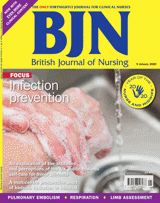Nursing and midwifery will be in the spotlight throughout 2020, as it has been declared the ‘International Year of the Nurse and Midwife’ by the World Health Organization (WHO). We also mark 200 years since the birth of Florence Nightingale. Nightingale, who died aged 90 in 1910, is seen as the philosophical founder of modern nursing as well as a female icon, a healthcare pioneer, a competent and respected researcher, statistician and analyst, an innovator, entrepreneur and leader. Throughout 2020 there will be celebrations of the legacy she left. Nightingale inspired and continues to inspire nurses globally, and her work has also informed mathematicians, architects, public health workers and activists.
Florence Nightingale respected patients regardless of their social class, disabilities, hygiene or occupation and she insisted that a real nurse would abandon any class differences (Nelson and Rafferty, 2010). Nightingale's influence on nursing continues; she personified many of the ideas that are key in nursing today—values, vision and voice, the precursor in many ways to the 6Cs (Cummings and Bennett, 2012). Her legacy of philosophical fundamentals still pervades the profession today. The history of nursing has not been written. It is still being written and will continue to be in the making as the role and function of the nurse responds dynamically and effectively to the needs of the people we have the privilege to serve.
As a passionate statistician, Nightingale conducted extensive research and analysis. She published more than 200 reports and pamphlets on a wide range of issues including hygiene, hospital administration and design, midwifery and health care for the poor, concerned with the most basic needs of human beings and all aspects of the environment locally and globally. Williams (2008), however, suggested that much of her reputation is based on the myths created by the popular press at the time of the Crimean war.
Nightingale was a nurse, educator, administrator, communicator, statistician and environmental activist. These attributes can be clearly identified in the Nursing and Midwifery Council's (2018)Standards of Proficiency for Registered Nurses. Nightingale was ahead of her time; she began to write in the 1880s that it would take 100–150 years before educated and experienced nurses would arrive to change the healthcare system. Nurses of today are the 21st-century Nightingales. We have to envisage our role beyond nursing and see ourselves as health broadcasters and social media communicators, transforming health and social care with others and carrying forward Nightingale's vision of social action to create a healthy world.
The first ever International Year of the Nurse and Midwife provides a ‘once in a generation’ opportunity to raise the status and profile of nurses and midwives globally. Both professions are invaluable to the health of people everywhere—without nurses and midwives, it will not be possible to achieve the WHO Sustainable Development Goals or universal health coverage. The WHO recognises the crucial role of nurses and midwives on a daily basis, and the enormous contribution they make. While we celebrate this, it is also important to ensure that the shortage of these two professions across the globe is addressed.
It could be suggested a profession's fascination with a role model who died over 100 years ago will hold back progress, but I could not disagree more. Her words and her work still inform contemporary nursing. However, this year we must also acknowledge the outstanding contribution made by every contemporary nurse and midwife.

